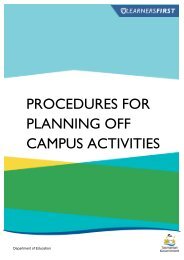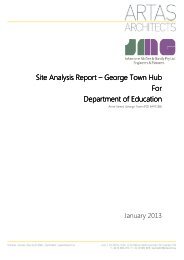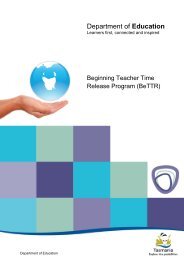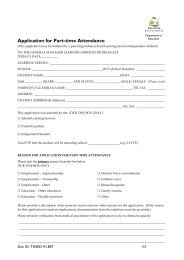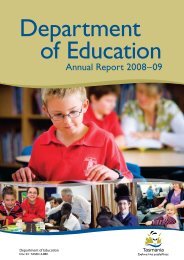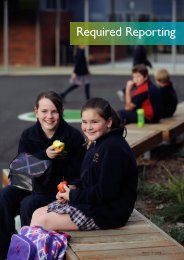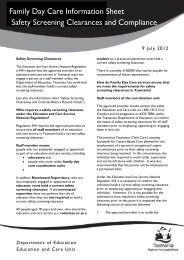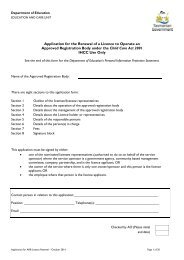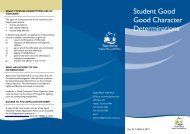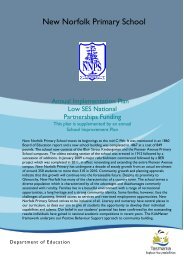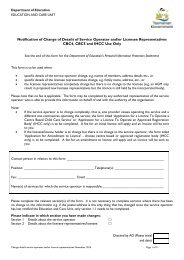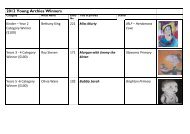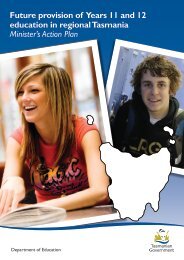Department of Education
DoE Annual Report 2010-2011 - Department of Education
DoE Annual Report 2010-2011 - Department of Education
- No tags were found...
You also want an ePaper? Increase the reach of your titles
YUMPU automatically turns print PDFs into web optimized ePapers that Google loves.
Output group 1:<br />
Pre-Compulsory and Compulsory <strong>Education</strong><br />
Description<br />
The purpose <strong>of</strong> this output group is to provide a range<br />
<strong>of</strong> educational services that will help students develop<br />
intellectually, socially, morally, emotionally and physically<br />
in a stimulating, inclusive and supportive environment.<br />
These services are focused on the delivery <strong>of</strong> education<br />
to students in schools enrolled in classes up to Year 10.<br />
The department’s outcomes to which this output group<br />
contributes are:<br />
• all students in Tasmanian Government schools<br />
receiving high quality teaching focused on the<br />
achievement <strong>of</strong> high standards<br />
• student progress being assessed, monitored and<br />
reported against standards that are consistent across<br />
schools<br />
• a fair and just distribution <strong>of</strong> the benefits <strong>of</strong> schooling<br />
across all students, leading to minimal difference in<br />
measurable outcomes between identified student<br />
groups<br />
• all students in Tasmanian Government schools<br />
receive teaching that appropriately utilises<br />
information and communication technology to<br />
provide more effective learning<br />
• all students participate fully in schooling and complete<br />
schooling until the end <strong>of</strong> Year 12 or the equivalent<br />
• students perform at nationally comparable<br />
achievement levels<br />
• parents/carers <strong>of</strong> students participating in the<br />
schooling <strong>of</strong> their children, and the community<br />
and the general public are informed on educational<br />
matters and involved in their school communities<br />
• improved access to child care services that meet<br />
state licensing guidelines and national standards for all<br />
parents, carers and families.<br />
Output group 2: Post-Compulsory <strong>Education</strong><br />
and Skills Development<br />
Description<br />
The purpose <strong>of</strong> this output group is to facilitate the<br />
provision <strong>of</strong> Year 11 and 12 education and formally<br />
recognised VET by registered training providers,<br />
including schools.<br />
The outputs in this group directly address the longterm<br />
vision and goals set out in Tasmania Together,<br />
the Tasmanian Skills Strategy as well as the Tasmanian<br />
Innovation and Infrastructure strategies and the National<br />
Agreements for Skills and Workforce Development and<br />
<strong>Education</strong>.<br />
The department’s outcomes to which this output group<br />
contributes are:<br />
• all students in Tasmanian Government schools and<br />
colleges receive quality teaching leading to effective<br />
learning<br />
• all students participate fully in schooling and complete<br />
schooling until the end <strong>of</strong> Year 12, or a training course<br />
leading to a Certificate III outcome<br />
• students perform at nationally comparable<br />
achievement levels<br />
• all students in Tasmanian Government schools<br />
and colleges continue to receive teaching<br />
that appropriately utilises information and<br />
communications technology leading to more effective<br />
learning<br />
• fair and just distribution <strong>of</strong> the benefits <strong>of</strong> schooling<br />
across all students and minimal difference in<br />
measurable outcomes between identified student<br />
groups<br />
• parents/carers <strong>of</strong> students continue to participate in<br />
the schooling <strong>of</strong> their children and the community<br />
and the general public continue to be well informed<br />
on educational matters and involved in their school<br />
communities<br />
• a strong adult training system including the Tasmanian<br />
Skills Institute and the Tasmanian Polytechnic and a<br />
strong system <strong>of</strong> private training<br />
• provision <strong>of</strong> a quality assurance and regulatory<br />
framework for vocational education and training,<br />
involving:<br />
- registration <strong>of</strong> training providers<br />
- accreditation <strong>of</strong> courses<br />
- recognition <strong>of</strong> overseas qualifications.<br />
• approval and monitoring <strong>of</strong> apprentice and trainee<br />
training contracts<br />
• management <strong>of</strong> the purchase <strong>of</strong> vocational education<br />
and training from registered training organisations to<br />
ensure that:<br />
- the number <strong>of</strong> Tasmanians with post-compulsory<br />
education and training qualifications increases<br />
- partnership arrangements are developed between<br />
schools, colleges and the Tasmanian Polytechnic<br />
- training provision is aligned to the government’s<br />
economic and social policy including Tasmania’s<br />
development strategies and the needs <strong>of</strong> industry.<br />
Output group 3: LINC Tasmania<br />
Description<br />
The purpose <strong>of</strong> this output group is to provide statewide<br />
library and information services, archival and community<br />
learning services in accordance with the goals <strong>of</strong><br />
Tasmania Together.<br />
The department’s outcomes to which this output group<br />
contributes are:<br />
• an informed, empowered and technologically literate<br />
community <strong>of</strong> lifelong users <strong>of</strong> information and<br />
information technology<br />
• an improved quality <strong>of</strong> life for all Tasmanians and a<br />
culturally rich community<br />
• sustained economic development in the information<br />
age through community and individual innovation<br />
• equity <strong>of</strong> access to information and to resources for<br />
innovation<br />
• a community which values knowledge and ideas and<br />
learning for life<br />
• the enhanced capacity and increased opportunity for<br />
the community to have access to and use the cultural<br />
memory and documentary record <strong>of</strong> Tasmania<br />
• ensuring that government accountability is able to be<br />
monitored and assessed by the Tasmanian community<br />
through access to the evidence <strong>of</strong> the activities <strong>of</strong> the<br />
government.<br />
Organisational restructure<br />
On 7 June 2010, the former Minister for <strong>Education</strong> and<br />
Skills, Hon Lin Thorp, announced changes to the then<br />
current model for post-Year 10 education and training.<br />
As a result, the Tasmanian Academy and the Tasmanian<br />
94<br />
Financial Statements – Notes



